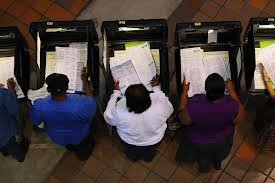Tuesday, November 6th is Election Day for the majority, but absentee and early voting began weeks ago. While I rarely give the political arena much thought (please, hold your abuse. I understand I am a political slacker), I have noticed a lot of news stories recently centered around the concept of early voting. After a while, I started to take a small (very small – after this article I probably won’t think of it again) in how this voting trend/privilege can change the landscape of the Presidential election. Here is what I learned.
How Soon Can Constituents Vote?
Short answer? It varies. Each state has their own regulations in regards to when a person can cast an early vote. For instance, in South Dakota voters could make up their mind and cast their vote beginning September 21. In Maryland, early voters couldn’t begin voting until October 27.
Can Anyone Vote Early?
As with most political topics, the answer is unclear. 15 states have no-excuse early voting, but the best way to determine if you can vote early to avoid the lines and frustration on the actual election day is to call your local voting officials and ask what the requirements are. Of course, if you are reading this now, you are kind of out-of-luck until the next election.
How Does Early Voting Help Political Campaigns?
Early voting allows political campaigns to begin reducing the number of voters they need to target on Election Day. For instance, if South Dakota residents can begin voting in late September campaigns schedule more stops, air an increased number of ads in that state prior to when early voting begins. For those constituents in other states that cannot begin voting until later, closer to the actual election date, campaigns can spend more time later in the campaign promoting their agendas in these states. The early voting process aids campaigns in making strategic campaigning decisions when it comes to spending their money, a fiscal lesson they will forget when they actually take office.
Early voting also gives the candidates a clearer idea of how they will fare on Election Day; which states they need to target more aggressively to gain the majority of electoral votes.
What are The Cons of Early Voting for Politicians and Constituents?
Some voters give early voting the finger, afraid that late developments in the political campaigns could occur that may have had the potential to sway their vote. Truthfully, unlike daytime television, there are rarely 11th hour confessions that would have the potential to sway thousands of early voters.
The candidates may have to work a little harder to gain back votes lost during early election, but knowing they lost the votes and have to work to gain them back somewhere else is actually a bit of a pro. Not all politicians may agree, but knowing 30 days out that they are trailing is better than 30 minutes before the polls close and campaigning to gain extra votes is not an option.
How many of YOU are early voters. Share with us your reasons for voting early here or on our social media pages. We want your voice to be heard!


![[Google]](/wp-content/plugins/easy-adsense-lite/google-light.gif)
